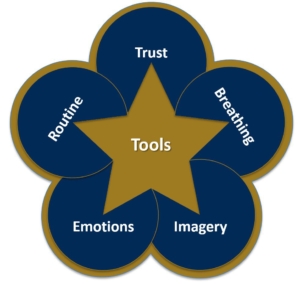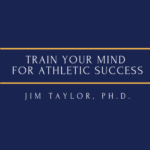 This post is the last of my five-part series describing my Prime Performance System which encompasses everything I know about the psychology of sport. This post will introduce five practical mental tools you can use to get the most out of your competitive efforts. These five mental tools are the final piece of the prime performance puzzle that enables you to take the four previous parts of my Prime Performance System (Attitudes, Obstacles, Training, Mental Muscles) and focus them entirely on what you need to do to perform your best when it counts most, namely, in your biggest competitions of the season. Importantly, these mental tools allow you to take the leap from performing well in training to performing great in competition.
This post is the last of my five-part series describing my Prime Performance System which encompasses everything I know about the psychology of sport. This post will introduce five practical mental tools you can use to get the most out of your competitive efforts. These five mental tools are the final piece of the prime performance puzzle that enables you to take the four previous parts of my Prime Performance System (Attitudes, Obstacles, Training, Mental Muscles) and focus them entirely on what you need to do to perform your best when it counts most, namely, in your biggest competitions of the season. Importantly, these mental tools allow you to take the leap from performing well in training to performing great in competition.
Emotions
On day of the competition, you will experience many emotions, some pleasant and helpful, others less so. Emotions that will help you perform your best include inspiration, excitement, and pride. Emotions that will prevent you from performing up to your capabilities include fear, frustration, disappointment, and worry. I have found that, in my work with athletes over the years, it is emotions, not natural ability or fitness or training (though all are necessary), that make the difference between performing your best and achieving your sports goals and not.
Of all the mental areas in which I work with athletes, emotions are perhaps the most challenging to understand and change because they are a reaction to your attitudes, beliefs, and perceptions about the competition that you take with you in the competitive arena. For example, if you don’t believe you can be successful, you will likely experience fear or worry. Whatever negative emotions you experience before a competition, they are difficult to change just before you compete. Ideally, you want to alter those attitudes, beliefs, and perceptions that lead to the unpleasant emotions before you get to the competition, so those emotions don’t arise. Moreover, you want to establish a way of thinking about the competition that will generate positive emotions that will drive you to outstanding performance.
Imagery
Mental imagery is the most powerful mental tool at your disposal. It involves seeing and feeling yourself preparing for and performing successfully in a competition many times over before you get to the competition. Though it should be used frequently as part of your normal training program during your prep period, it is a vital tool on day of the competition to put you in that ideal state of mind and body that will allow great performances to emerge.
Imagery offers so many benefits on day of the competition. It helps you to program your mind and body for how you want to perform. Imagery instills confidence by seeing and feeling yourself performing your best. It narrows your focus onto what you need to do to perform your best and blocks out distractions that can take you out of your zone. Imagery primes your body so that when the competition begins, it is physiologically ready to go all out from start to finish. Finally, repeatedly imagining yourself performing in a competition enables you to feel, when you walk onto the field of play, that you’ve already performed well there, so the actual competition doesn’t feel like a big deal.
You can use imagery in several essential places on day of the competition. First, do imagery when you get up in the morning. Imagining yourself performing well and having a great competition sets the tone for the day, getting you excited and positive about the day. Second, as a part of your pre-competition routine, in which you prime your mind with great confidence, focus, and mindset, and your body with energy. Finally, just before the competition begins, giving you an extra boost of good images and feelings for you to take with you as you begin to compete.
Routines
I don’t know a professional or Olympic athlete who doesn’t have a clearly defined pre-competition routine that they go through before every competition. Why? Because routines provide you with many benefits to help you perform your best on day of the competition. First, your routine is comprised of everything you need to do to be totally prepared to perform well. Second, a well-ingrained routine triggers feelings of confidence and comfort even in the biggest competitions because it sends the message to your mind and body that this is just another competition you are getting ready for. Third, it provides feelings of familiarity, predictability, and control, all of which increase your ease and combat doubts and nerves that might creep in before the start of a competition.
The challenge with routines is that there is no single ideal routine for everyone. For every great athlete, there is a routine that meets their own unique psychological, emotional, and physical needs. Yet, they all include the same basic elements: equipment, physical, and mental. You want to figure out what you need to do in those three areas to ensure that you are prepared in every way to perform your best when it matters most.
A routine isn’t something that you will develop in one competition. Rather, it involves a process of experimentation to help you decide what works best for you. In time, you will find precisely what you need to do to feel physically and mentally ready to perform your best.
Breathing
Few people would think of breathing as a mental tool. Breathing is just something you do that keeps you alive, right? And breathing is automatic, something you do every moment of every day without thought or action on our part. Yet, breathing is one of the most potent tools that can impact your mind and your body, either positively or negatively, in your practice and competitive efforts.
Breathing is tool that you can use to your advantage physically and mentally. Using breathing as a tool is so important because there is so much that affects you physically that you don’t have direct control over such as blood flow, adrenaline, fatigue, and pain. Breathing is the one physiological action that you can regulate consciously. For example, if you are nervous before an event, you can take deep breaths to calm yourself down. Or, if you are feeling flat and lethargic, you can take vigorous exhales to fire yourself up. Breathing also helps you focus. By concentrating on your breathing, you block out distractions and bring your focus inward. Breathing also can determine your attitude during a competition. For instance, strong and forceful breaths can trigger an aggressive attitude, while slow and deep breaths can produce a patient attitude.
You can make breathing a mental tool rather than just an automatic action in several ways. First, you can look at where you can use breathing to improve your preparations and your performance, for example in your pre-competitive routine or to help recover from a tiring effort. Second, you can focus on it deliberately before and during practice and competition. Finally, once you’ve practiced breathing in your sport to the point at which it is an ingrained habit, you can to use it to help you prepare and performance better in pursuit of your athletic goals.
Trust
Most people wouldn’t think of trust as a mental tool because it isn’t something you do, like imagery or a routine. In a way, trust comes from some things you don’t do, namely, thinking, trying, and controlling. The reality of sport is that there often isn’t time think, analyze, or control when you’re performing. If you get stuck in your head, you’re bound to perform poorly.
Trust involves having a basic belief that you have prepared yourself to achieve your goals and your body will do what you have trained it to do, in this case, perform your best. It also includes a fundamental faith that, if you give your best effort, good things will happen. Trust enables you to approach competitions with confidence, commitment, and courage, and without fear, doubt, or worry.
For you to have complete trust in your performing when a competition starts, you must have established trust in every aspect of your sport including your fitness, technique, tactics, equipment, coaching, mind, and preparations.
The difficulty with trust is that it takes time to develop. You must have physical, technical, and mental training programs that you believe will lead you to your goals. You can begin to trust yourself in less important situations, such training, and gradually build your confidence until you feel complete trust in your performing your best in big competitions. Ultimately, trust takes a leap of faith because there are no guarantees that it will pay off. As a result, you can’t trust yourself until you take the risk of trusting yourself. But when you do finally trust yourself, you will very likely perform your best and you will achieve your sports goals.
Do you want to learn more about how my Prime Performance System can help you or your young athletes achieve their sports goals? Get your FREE Prime Sport: Psychology of Champion Athletes e-book.


